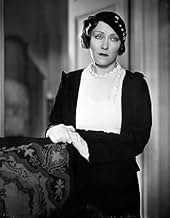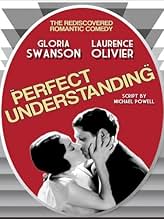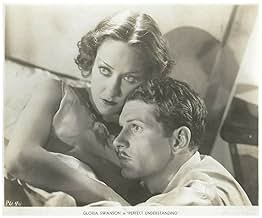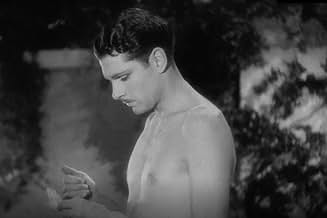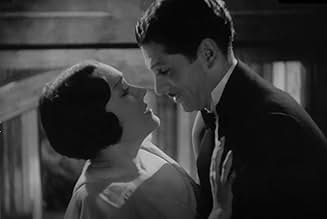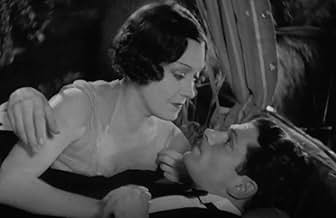Füge eine Handlung in deiner Sprache hinzuA young couple decide to marry under the condition that they agree never to disagree. That agreement is soon put to the test when the husband finds himself attracted to a beautiful young wom... Alles lesenA young couple decide to marry under the condition that they agree never to disagree. That agreement is soon put to the test when the husband finds himself attracted to a beautiful young woman.A young couple decide to marry under the condition that they agree never to disagree. That agreement is soon put to the test when the husband finds himself attracted to a beautiful young woman.
Evalyn Bostock
- Maid
- (Nicht genannt)
Syd Crossley
- Butler
- (Nicht genannt)
Empfohlene Bewertungen
Gloria Swanson had formed a film company just to make this film. Unfortunately, this is precisely the type of film that her most famous character, Norma Desmond, likely wanted to make in Sunset Boulevard.
It is really a silent film with dialog replacing the text screens. The actors make grand extravagant gestures, turn their faces to and fro while fluttering their eyelids. The incessant music swells at appropriate moments to indicate high drama. The dialog seems like a nuisance to be summarily added and neglected - after all Swanson had done pretty well for all those years without dialog - why worry about that now.
The quite modern premise of the film, a semi-open marriage, and the conflict brought on by the juxtaposition of the end of the flapper era avant-garde attitudes with the conservative Victorian mores ensconced in the judicial attitude towards divorce should have made the film more interesting that it was.
However, the only real interest and tension is generated by incredible boat race where cocktails are drunk at every station to make the race more difficult! Prohibition was about to be repealed and the celebration of alcohol consumption in such stark contrast to today's attitudes is fascinating.
Tighter editing, better pacing and dialog might have made this worthwhile. As is, it is a curio from the early years of sound, and of interest to the historian and perhaps to the film buff as a primer on the world of Norma Desmond.
It is really a silent film with dialog replacing the text screens. The actors make grand extravagant gestures, turn their faces to and fro while fluttering their eyelids. The incessant music swells at appropriate moments to indicate high drama. The dialog seems like a nuisance to be summarily added and neglected - after all Swanson had done pretty well for all those years without dialog - why worry about that now.
The quite modern premise of the film, a semi-open marriage, and the conflict brought on by the juxtaposition of the end of the flapper era avant-garde attitudes with the conservative Victorian mores ensconced in the judicial attitude towards divorce should have made the film more interesting that it was.
However, the only real interest and tension is generated by incredible boat race where cocktails are drunk at every station to make the race more difficult! Prohibition was about to be repealed and the celebration of alcohol consumption in such stark contrast to today's attitudes is fascinating.
Tighter editing, better pacing and dialog might have made this worthwhile. As is, it is a curio from the early years of sound, and of interest to the historian and perhaps to the film buff as a primer on the world of Norma Desmond.
...from United Artists and director Cyril Gardner. Posh British society couple Judy (Gloria Swanson) and Nicholas (Laurence Olivier) decide to get married, but with a "perfect understanding" that they won't tie each other down, and allow the other to maintain their freedom. When Nicholas has a fling with an old flame, Judy spends the night with another man, and their open marriage is sorely tested.
By 1933, these "sophisticated open marriage" melodramas were already old-hat, and nothing new is added here. Swanson and Olivier have very little chemistry, and Olivier has yet to develop much screen charisma (plus he looks downright sickly in his swimsuit scene). The obtrusive, bombastic score is also a detriment. This was an expensive failure for Swanson, who also produced. Co-star Michael Farmer was Swanson's husband at the time. Director Gardner was hired as editor but took over directing duties when original pick Rowland V. Lee was fired.
By 1933, these "sophisticated open marriage" melodramas were already old-hat, and nothing new is added here. Swanson and Olivier have very little chemistry, and Olivier has yet to develop much screen charisma (plus he looks downright sickly in his swimsuit scene). The obtrusive, bombastic score is also a detriment. This was an expensive failure for Swanson, who also produced. Co-star Michael Farmer was Swanson's husband at the time. Director Gardner was hired as editor but took over directing duties when original pick Rowland V. Lee was fired.
I first saw Gloria Swanson in "Sunset Blvd" (1950) and loved her in the movie. She played an actress who was past her prime yet behaved as though she was in her heyday. Throughout the movie it was as though she was always on stage, which is how I imagine actors and actresses behave when they try to hold on to their glory days. Her movements, expressions, and speech were exaggerated like there was a camera focused on her at all times.
After watching "Perfect Understanding" I realize that's just the way Gloria Swanson acts. As good as she was in "Sunset Blvd" she was equally terrible in "Perfect Understanding." The speech, the expressions, and the behavior were exaggerated and made even more comical by the music. And she and Joan Crawford have mastered the frozen, wide-eyed, crazy look which looks so unnatural.
In "Perfect Understanding" Swanson plays Judy Rogers, a high society woman from America who was in love with Nicholas Randall (Laurence Olivier), a high society man from England. The two were crazy in love, but Judy wasn't keen on the idea of marriage, no matter how many times Nicholas proposed. Eventually, Judy gave in and agreed to marry Nicholas with a contract stating that they'd always have a "perfect understanding" and that they'd "never be husband and wife but lover and mistress. And above everything else, to remain individual."
To Judy, jealousy was an ugly trait only to be found in commoners or the insecure. She'd have the opportunity to put her beliefs to the test because orbiting around her and Nicholas was Stephanie (Nora Swindburne), a married woman who was unabashedly in love with Nicholas. She would ruin her own marriage as well as Nicholas's if given the chance.
"Perfect Understanding" followed a predictable pattern. Unfortunately, it was another high-society movie involving grand exclamations of love and affection as well as rampant infidelity. It's a tired theme that's simply redone with new actors and a slightly adjusted script. The moment I saw Stephanie ogling Nicholas I knew what we were in for. There was nothing novel about this movie nor was there anything worth watching unless you're a fan of Gloria Swanson or Laurence Olivier.
Free on YouTube.
After watching "Perfect Understanding" I realize that's just the way Gloria Swanson acts. As good as she was in "Sunset Blvd" she was equally terrible in "Perfect Understanding." The speech, the expressions, and the behavior were exaggerated and made even more comical by the music. And she and Joan Crawford have mastered the frozen, wide-eyed, crazy look which looks so unnatural.
In "Perfect Understanding" Swanson plays Judy Rogers, a high society woman from America who was in love with Nicholas Randall (Laurence Olivier), a high society man from England. The two were crazy in love, but Judy wasn't keen on the idea of marriage, no matter how many times Nicholas proposed. Eventually, Judy gave in and agreed to marry Nicholas with a contract stating that they'd always have a "perfect understanding" and that they'd "never be husband and wife but lover and mistress. And above everything else, to remain individual."
To Judy, jealousy was an ugly trait only to be found in commoners or the insecure. She'd have the opportunity to put her beliefs to the test because orbiting around her and Nicholas was Stephanie (Nora Swindburne), a married woman who was unabashedly in love with Nicholas. She would ruin her own marriage as well as Nicholas's if given the chance.
"Perfect Understanding" followed a predictable pattern. Unfortunately, it was another high-society movie involving grand exclamations of love and affection as well as rampant infidelity. It's a tired theme that's simply redone with new actors and a slightly adjusted script. The moment I saw Stephanie ogling Nicholas I knew what we were in for. There was nothing novel about this movie nor was there anything worth watching unless you're a fan of Gloria Swanson or Laurence Olivier.
Free on YouTube.
"Perfect Understanding" is a simply dreadful film--very, very dated, dull and filled with folks you really cannot relate to or like. It also features the rather odd romantic pairing of Gloria Swanson and Laurence Oliver--a pairing that doesn't quite work.
The film begins with Swanson singing--something you just don't need to hear unless you are a masochist. Fortunately, Olivier's character didn't love her singing either, though otherwise they play rich folks who have nothing better to do than go to parties, travel the world and talk...a lot. And one of the things they love to talk about is their love for each other. However, Swanson's character is apprehensive to marry, as she's afraid that over time their love will fade. So, they agree to marry and stay married until they begin to argue (ooo, how romantic).
The biggest problem about this film is that it was the Depression and folks were out of work. So, such a mannered and dull film involving the rich and lazy seems strange--and hard to enjoy. The characters seemed rather one-dimensional and annoying. In particular, Swanson's acting didn't help, though Olivier did a nice job in spite of the film's many shortcomings. Dull and probably not worth your time.
The film begins with Swanson singing--something you just don't need to hear unless you are a masochist. Fortunately, Olivier's character didn't love her singing either, though otherwise they play rich folks who have nothing better to do than go to parties, travel the world and talk...a lot. And one of the things they love to talk about is their love for each other. However, Swanson's character is apprehensive to marry, as she's afraid that over time their love will fade. So, they agree to marry and stay married until they begin to argue (ooo, how romantic).
The biggest problem about this film is that it was the Depression and folks were out of work. So, such a mannered and dull film involving the rich and lazy seems strange--and hard to enjoy. The characters seemed rather one-dimensional and annoying. In particular, Swanson's acting didn't help, though Olivier did a nice job in spite of the film's many shortcomings. Dull and probably not worth your time.
A young, moustached Olivier looks extremely ill at ease in this good-looking but garrulous and boring marital drama set in the South of France but with hardly any of the cast actually leaving the studio. He later called it "the worst film ever made"; presumably that was before he made 'The Betsy'!
Wusstest du schon
- WissenswertesMichael Farmer's acting was so bad that, despite being married to the movie's star and main backer Gloria Swanson, he was all but edited out of the movie, giving more screentime to Sir Laurence Olivier.
- Zitate
Ivan Ronnson: Jealousy is a wild beast.
- VerbindungenFeatured in Boulevard! A Hollywood Story (2021)
- SoundtracksI Love You So Much That I Hate You
(uncredited)
Music by Henry Sullivan
Lyrics by Rowland Leigh
Sung by Gloria Swanson
Top-Auswahl
Melde dich zum Bewerten an und greife auf die Watchlist für personalisierte Empfehlungen zu.
Details
- Erscheinungsdatum
- Herkunftsland
- Sprache
- Auch bekannt als
- De mutuo acuerdo
- Drehorte
- Produktionsfirma
- Weitere beteiligte Unternehmen bei IMDbPro anzeigen
- Laufzeit
- 1 Std. 20 Min.(80 min)
- Farbe
- Seitenverhältnis
- 1.37 : 1
Zu dieser Seite beitragen
Bearbeitung vorschlagen oder fehlenden Inhalt hinzufügen


